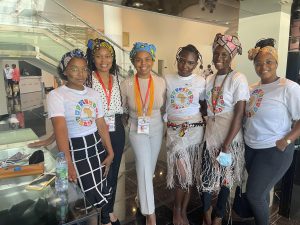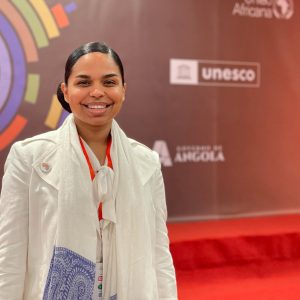Contributed by Pauline Batista
Between November 27and December 2, 2021, I participated in the Biennale of Luanda as a UNESCO Youth Representative. The Government of Angola hosted the event organized by UNESCO and supported by the African Union. In partnership with the Pan African Youth Network for Culture of Peace (PAYNCOP), UNESCO initially selected 118 youth from African countries and the Diaspora. I was in complete shock when I learned that I was one among six youth chosen to fly to Luanda by presidential invitation of the Government of Angola to be in direct discussion with Heads of state from various countries, including Portugal (Marcelo Rebelo de Sousa/ present on remarks link) and Costa Rica (Epsy Campbell Barr/ photo attached). I was the only representative of the Diaspora. The joy of being the sole representative across so many stellar candidates truly humbled me. There were students from all over the world and selected participants from US ivy league universities. And most importantly, the research work that caught their attention was my work that is somewhat critical of UNESCO and how countries from the Global South engage with UNESCO conventions and its standards. You can check out my opening remarks at the Biennale of Luanda’s Intergenerational Dialogue session with Heads of state here: https://youtu.be/P9HgCx3px5g
when I learned that I was one among six youth chosen to fly to Luanda by presidential invitation of the Government of Angola to be in direct discussion with Heads of state from various countries, including Portugal (Marcelo Rebelo de Sousa/ present on remarks link) and Costa Rica (Epsy Campbell Barr/ photo attached). I was the only representative of the Diaspora. The joy of being the sole representative across so many stellar candidates truly humbled me. There were students from all over the world and selected participants from US ivy league universities. And most importantly, the research work that caught their attention was my work that is somewhat critical of UNESCO and how countries from the Global South engage with UNESCO conventions and its standards. You can check out my opening remarks at the Biennale of Luanda’s Intergenerational Dialogue session with Heads of state here: https://youtu.be/P9HgCx3px5g
I am fortunate to have had El Instituto on my side from the very beginning of my journey as a graduate student. The faculty and staff of El Instituto encouraged me to learn what I needed to become a doctoral student. And thanks to that unconditional support, I am a passionate researcher who collaborates with youth in UNESCO Heritage sites to get the attention of policymakers through Participatory Video and other Participatory Action initiatives. The work started in LLAS 5000, a mandatory course for MA students at El Instituto. While in Luanda, I asked the President of Portugal, “How is it that we turn conflict into dialogue at a transnational level?”- a complex question. After my question, President Marcelo Rebelo de Sousa stepped down from the podium and gave me the warmest hug.
I am an Afro-Brazilian raised in a UNESCO Heritage site. I grew up with many questions that the academy has been helping me address in collaboration with youth (and their new questions). The more I work with youth, the more I realize that academic work in its nature may feel isolating, but it is collective. I am content that I was in dialogue with presidents. Still, the most meaningful part of my journey was to work directly with Angolan youth who do work about heritage, education, and human rights through art. I saw myself a lot in working with them. More than ever, it is time we think of the academy as a place of collective knowledge creation and attribution because if research is not for the benefit of people, why bother? I learned during lessons during my short time in Angola; the first one is that there are many Africas even within Angola. But the biggest one was how we must be careful in the work we do because folks are listening, and most importantly, we owe youth better. To me, being a UNESCO Youth representative became the responsibility to listen to learn how to do better. I am happy to keep the conversation going. You can find me at pauline.batista@uconn.edu or on Instagram: @paulinefrombrazil
collaboration with youth (and their new questions). The more I work with youth, the more I realize that academic work in its nature may feel isolating, but it is collective. I am content that I was in dialogue with presidents. Still, the most meaningful part of my journey was to work directly with Angolan youth who do work about heritage, education, and human rights through art. I saw myself a lot in working with them. More than ever, it is time we think of the academy as a place of collective knowledge creation and attribution because if research is not for the benefit of people, why bother? I learned during lessons during my short time in Angola; the first one is that there are many Africas even within Angola. But the biggest one was how we must be careful in the work we do because folks are listening, and most importantly, we owe youth better. To me, being a UNESCO Youth representative became the responsibility to listen to learn how to do better. I am happy to keep the conversation going. You can find me at pauline.batista@uconn.edu or on Instagram: @paulinefrombrazil